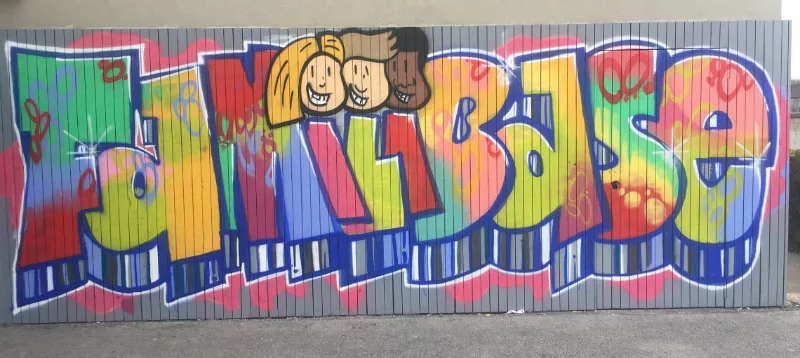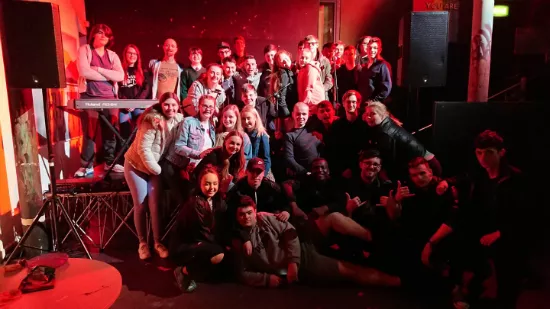It’s not WHAT you do, it’s the WAY that you do it – how non-formal learning works for a community in Dublin

Siobhán O’Reilly talks about the work of FamiliBase in Ireland, and how it provides the community with the type of learning it needs.
Working with our community, mixing formal and non-formal learning
One of the things that makes FamiliBase different is how we mix different types of learning – formal, non-formal and informal. Our client base can sometimes face some of life’s major challenges and our response only works because it is tailored to their needs, rather than being imposed from outside.
We work in Ballyfermot in the west of Dublin. Although we’re in Ireland’s capital city, Ballyfermot has experienced high levels of inequality at a range of levels over the years. Despite the many strengths of the community and a wide range of services working in and with it, deprivation scores remain at some of the highest in Ireland.
Ballyfermot’s challenges
|
But FamiliBase believes that this is not due to a deficit in the community nor with the children, young people and families that live in it.
Rather, deprivation is symptomatic of how systems are established and how they engage with communities and the individuals and families that live in them. So we need different ways of engaging with people.
Working informally
Providing opportunities for people to learn non-formally and informally is a vital part of what we do. At times, formal learning environments and the system they operate within can be ineffective for some children and young people. So we support young people to develop a range of skills that can complement formal learning. Examples of some of the skills that are developed through FamiliBase informal and non-formal education opportunities include concentration, communication, confidence, decision-making, conflict-resolution, self-management/regulation, reflection, self-directed learning, responsibility for choices. We develop these skills through three core service elements: Early Years Supports; Child and Parent Supports; and Youth and Community Supports.
The FamiliBase Service
|
Being there for people where and when they need us
Our services include a number of defining features so we can best meet the needs of the Ballyfermot community:
1. Having an integrated approach to addressing the multidisciplinary needs of young people, the ‘one stop shop’ concept.
2. Prioritising young people who are ‘most at risk’ in the community (whilst not forgetting the need for some universal programme provision too!) Our community has a number of needs, so we prioritise:
- young men engaged or at risk of becoming involved in anti-social behaviour;
- members of the travelling community;
- young people at risk of developing dependency on substances;
- young people at risk of early school leaving;
- early school leavers.
3. Giving the Arts a significant role in programme delivery. Access to and participation in the Arts has huge transformative power and we provide a range of high-quality Youth Arts programmes. The FamiliBase centre has a purpose-built recording studio and black box theatre.
4. We are there when and where people need us. FamiliBase operates Tuesday to Saturday with the average closing time being 10pm. There are three Youth Workers and a Youth Work Project Leader who work alongside seven other staff on the Youth and Community team. The multidisciplinary approach facilitates enhanced programme delivery for young people, with a range of needs being addressed and supported.

We can’t do it all alone… and we wouldn’t want to!
FamiliBase works with and alongside a range of different organisations in the work it does with children, young people and families. These include schools, training centres, alternative education centres, further education colleges, Institutes of Technology and universities. Sometimes the collaborations involve co-facilitation of groups, separate delivery of complementary material, learning experiences designed and delivered by FamiliBase during school time e.g. Transition Year Arts programmes, lecturing 3rd level students. Sometimes it involves an advocacy piece with and on behalf of the young person/parent.
FamiliBase recognises and acknowledges the vital role that effective engagement with and in education plays in predicting positive outcomes for children and young people. The education system can play a transformative role in addressing the intergenerational inequalities that can exist in communities.
However, in our experience sometimes an advocacy approach is required to make sure the education system is flexible and led by individual needs. FamiliBase helps children, young people and families take messages to local education and health providers about what works for them and what is not working for them. FamiliBase also helps the community talk about the impact of poverty and inequality on their families and community over time.
The secret is to co-create solutions with the community
FamiliBase believes that the ‘recipe for success’ is based on the philosophy that underpins our organisational decision making and programme delivery:
It is ‘how’ you do it, not what you do!
And it can be the simplest of things that can effectively engage a young person/adult that has had previous negative educational experiences.
Our practice is context-specific, led by individual needs and based on relationships. The key to our work is:
- the recruitment of a mix of local staff and staff from outside Ballyfermot;
- having the appropriate fusion and mix of staff skill-sets and expertise;
- ensuring that staff have or can develop the approach that is rooted in our organisational philosophy.
But just as important is the co-creation of programmes and solutions with children, young people and families—FamiliBase works and delivers with and alongside the community.
Siobhán O’Reilly is the Chief Executive Officer of FamiliBase—Ballyfermot’s Centre for Children, Young People and Families. Having completed her primary degree in European Studies, Siobhán trained initially as a post-primary teacher and then went on to work in non-formal education settings with young people who the formal system were unable to facilitate due to the complexities of their needs and the lack of flexibility in the formal system to accommodate them. Siobhán has over 20 years’ experience of working at a formal education, non-formal education and community level in relation to the effective engagement and participation of some of the most marginalised children, young people and families. Siobhán was keen to utilise this experience and ensure that data relating to this became part of the knowledge base, especially given the dearth of literature relating to those who experience inter-generational inequality, Siobhán completed a Professional Doctorate in Education in 2012 with the title of her thesis being " The Silent Partners. Leading parental involvement in primary schools in areas experiencing education inequality”. Siobhán also has experience of leadership and management in a community context and in a context of multiple stakeholders. She has been the CEO of FamiliBase since March 2014.




